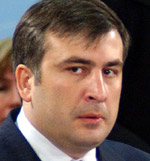The next Georgian-Russian scandal would rarely be focused on if it didn’t have an “atomic component”. Scandals and crises have become such an inseparable part of interstate relations that it’s already impossible to imagine those relations without them. But the “atomic story”, excuse me, is not like the phony wine or “Borzhomi” or even the revelation of the Russian officials’ spy network and the poor farmers and the taxi driver of the semi-destructed “Zhiguli” who were working with them. The arrest of the person selling 100 grams of uranium (used in nuclear weapon production), who was carrying the uranium in a polyethylene bag, is something else. This information was published last week by the “New York Times” and “Associated Press”. Georgian Minister of Internal Affairs Vano Merabishvili became the source of information for journalists. It was the same Merabishvili who had ceremonially presented the revelation of the spy network, after which Moscow applied so many “harmful” measures that it will take a long time for Tbilisi to get back on its feet. I don’t know whether it was due to the wrong translation or the bad wording of my Western colleagues, but after reading the story of the minister, not that I didn’t believe in his words, but some questions did come up.
What were the U.S. and Georgian special services so afraid about when they decided to arrest the uranium dealer? There is no doubt that they had to arrest him. But how did they get to Georgia? Recently, there was a suspicious story connected with the arrests of some Armenian on the Armenian-Georgian border and a Turk in Turkey, who were neither selling radioactive products, nor getting ready to sell them nor even wanted to buy any. It’s quite possible that this can be traced to the abovementioned, and perhaps not. Now Minister Merabishvili tells American journalists that it was decided to conduct the joint investigation in South Osetia, which has declared itself independent; independence, which the world hasn’t recognized; the world, which is inclined to recognize the independence of Kosovo. Why did they decide to search for uranium sellers in South Osetia? As the Georgian authorities say, excuse me, things are “anarchic” in South Osetia-the de facto authorities can’t control the situation at hand, the region not subject to Tbilisi is full of criminals, drug dealers, contrabands, etc. Well, there are drug dealers and contrabands everywhere, but uranium dealers with the uranium necessary for making bombs…what follows is the search for someone by the name of Khiltsagov.
The agent, that pretends to be a “trustworthy agent from the East”, finds that Khiltsagov, who by the way has nothing to do with South Osetia. Khiltsagov is a citizen of Russia and lives in North Osetia which, as we know, is an inseparable part of Russia. Khiltsagov promises the agent to sell a couple of more packs of uranium if all goes well the first time. The agent tricks him and brings him to Georgia; Georgian police catch Khiltsagov dealing and arrest him. They also arrest three Georgian citizens and neither the minister nor the police announce that. Khiltsagov is sentenced to 10 years in prison, while the unknown local citizens get an even shorter term; during interviews with American mass media, Minister Merabishvili accuses Russia for not cooperating with Georgia even in issues concerning security of atomic weapons. It turns out that they had caught Khiltsagov a year ago, sentenced him in the summer, while Moscow has ignored Tbilisi’s questions regarding this issue the whole time.
But it soon turned out that it’s not like that. Russian experts declared that the uranium confiscated from Khiltsagov was enriched, but the small amount of uranium for experiments wasn’t enough to find out where the uranium is from. Fine, they arrested someone from Osetia who is a Russian citizen with the uranium in his hand, blamed Russia, did a nice PR and meanwhile held talks with the U.S. regarding U.S.-Georgian cooperation. Why? Why did they cause a scandal six months after the sentencing? Why didn’t the special services finish the job? After all, Khiltsagov had promised to bring in more packages. If those packages exist, where are they?
The answers can evidently be found in the “uranium scandal” message of the Georgian Foreign Affairs Ministry, drawing the international community’s attention to the fact that the Abkhazian and South Osetian territories on the Russian-Georgian border are not controlled and that there may be imports of…massive destruction weapons. There is a call to have, if not Georgian, then at least international control there. In other words, we’re talking about the next attempt of Tbilisi to establish supervision on the entire length of the state border no matter what the cost-basically, reinstate territorial integrity. What an interesting coincidence-when the Georgian Foreign Affairs Ministry was dispersing its message, Georgian President Mikhail Sahakashvili was summarizing the results of his three-year presidential term in Kakheti. It was there where he declared that during those three years, Georgia has fortified and it is time to take decisive steps towards reinstating Georgia’s territorial integrity.
In closing, the Northern Osetian authorities have dispersed their message, saying that there has never been someone by the name of “Oleg Khiltsagov” in the territory of the Autonomous Republic. Well, there you have it.

